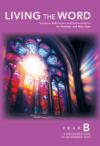Scripture Study for
Second Sunday of Advent
Baruch 5:1–9 / Psalm 126:3 / Philippians 1:4–6, 8–11 / Luke 3:1–6
<< Back to LECTIONARY RESOURCES
Understanding the Word
By Br. John R. Barker, OFM
Scholars date the composition of Baruch several centuries after the end of the Babylonian Exile. Much of the language in this passage, however, sounds like the end of the book of Isaiah, which was composed shortly after the Exile, when hopes for the immediate restoration of Jerusalem were still high. Baruch reveals that centuries later Israel still hoped in God’s promises. A key idea in this passage is God’s “glory,” which is mentioned several times. The word refers to God’s honor and reputation, but also God’s power and authority, manifested primarily in God’s intervention in human affairs. Baruch assures Jerusalem that she will in fact display God’s glory, that her renewal in justice and peace will be accomplished for and by the glory of God.
Paul begins his Letter to the Philippians by giving thanks that they have responded to the call to live and proclaim the gospel. This gospel as well as their response to it has been “the good work” of God, which will continue until the “day of Christ Jesus.” This term, taken from the Old Testament concept of the “day of the Lord,” refers to the culmination of God’s definitive intervention in the world, which will take place when Christ returns. Paul does not know when this will be, but in the meantime, the Philippians enjoy the benefits of Christ’s “righteousness,” which bears the fruit of purity and blamelessness. Thus, the transformation and the continued fidelity of the Philippians redound to the praise and glory of God.
Luke begins his Gospel by situating the arrival of the Messiah firmly within human history. The definitive intervention of God in human affairs is not something that disrupts history, even as it changes its course, but flows out of the history of Israel and, indeed, of the whole world. The passage from Isaiah, now seen to refer to John the Baptist, stems from the end of the exilic period and tells of the intervention of God to heal Israel’s past and to give Israel a future. Now God is about to do the same in Jesus, who will heal the past of the entire world and give it also a future.
